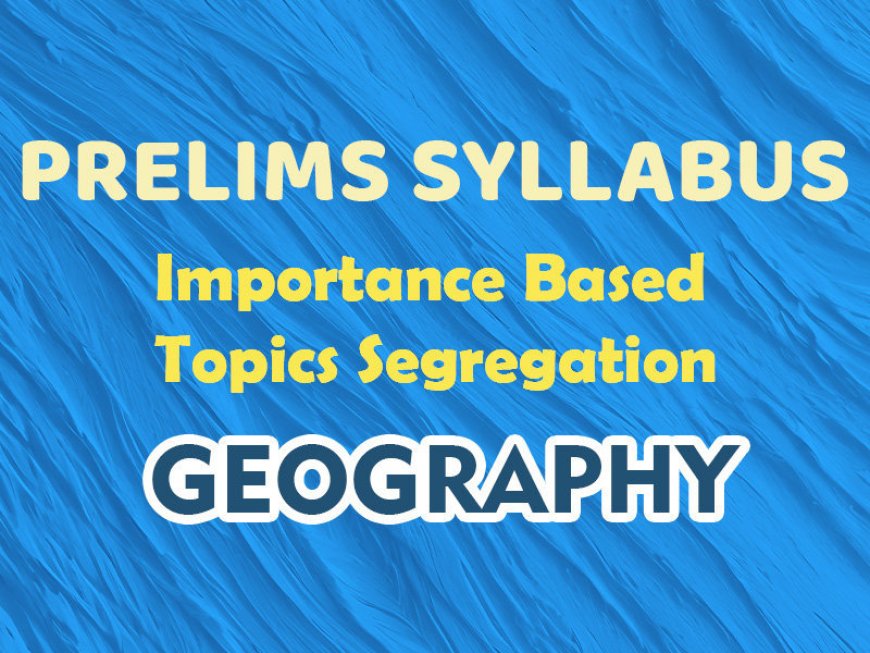Pre - Syllabus - Importance Based - Geography
Pre - Syllabus - Importance Based - Geography

Geomorphology (15-17)
· Earth's Interior (5-7)
o Composition and Structure
o Seismic Waves
· Plate Tectonics and Continental Drift (7-9)
o Theory and Evidence
o Plate Boundaries
· Earthquakes and Volcanoes (7-9)
o Causes and Effects
o Distribution of Earthquakes and Volcanoes
· Landforms and Processes (9-11)
o Weathering and Erosion
o Fluvial, Glacial, Aeolian, and Coastal Landforms
Climatology (17-19)
· Atmosphere Composition and Structure (5-7)
o Layers of Atmosphere
o Ozone Layer
· Weather and Climate (7-9)
o Temperature and Pressure Belts
o Wind Systems: Trade Winds, Westerlies, Polar Easterlies
· Monsoons and Indian Climate (9-11)
o Mechanism of Monsoons
o El Niño, La Niña, and ENSO
· Cyclones and Anticyclones (5-7)
o Tropical Cyclones
o Temperate Cyclones
Oceanography (13-15)
· Ocean Relief Features (5-7)
o Continental Shelf, Slope, Abyssal Plains
· Ocean Currents (9-11)
o Warm and Cold Currents
o Effects on Climate
· Marine Resources (3-5)
o EEZ and Marine Biodiversity
· Tides and Waves (3-5)
o Causes and Types
Biogeography (11-13)
· Ecosystems and Biomes (5-7)
o Types of Ecosystems
o Major Biomes of the World
· Biodiversity (5-7)
o Hotspots
o Conservation Efforts
· Soil Types and Distribution (5-7)
o Soil Formation
o Soil Profiles
Environmental Geography (9-11)
· Environmental Degradation (5-7)
o Deforestation
o Desertification
· Climate Change (7-9)
o Global Warming
o International Agreements (Paris Agreement)
· Sustainable Development (3-5)
o Renewable Energy Sources
o Conservation Strategies
Physical Features of India (17-19)
· Physiographic Divisions (9-11)
o Northern Mountains
o Indo-Gangetic Plains
o Peninsular Plateau
o Coastal Plains and Islands
· River Systems of India (11-13)
o Himalayan Rivers
o Peninsular Rivers
o River Projects and Dams
· Climate of India (9-11)
o Factors Influencing Climate
o Seasonal Variations
o Distribution of Rainfall
Resources of India (15-17)
· Mineral Resources (7-9)
o Distribution of Minerals
o Mining Areas
· Energy Resources (7-9)
o Coal, Oil, Natural Gas
o Renewable Energy Sources
· Agricultural Resources (11-13)
o Cropping Patterns
o Major Crops and Regions
o Green Revolution
Economic Geography of India (15-17)
· Industries in India (9-11)
o Iron and Steel Industry
o Cotton and Textile Industry
o IT Industry
· Transportation and Communication (7-9)
o Roadways, Railways, Airways, Waterways
o National Highways and Corridors
· Trade and Commerce (5-7)
o Major Ports
o Import and Export Commodities
Population and Settlement Geography (13-15)
· Population Distribution and Density (7-9)
o Demographic Trends
o Census Data Analysis
· Urbanization (7-9)
o Growth of Cities
o Smart Cities Mission
· Migration Patterns (5-7)
o Rural-Urban Migration
o Issues and Challenges
Soil and Vegetation of India (11-13)
· Soil Types in India (7-9)
o Alluvial, Black, Red, Laterite Soils
o Soil Conservation Methods
· Natural Vegetation (5-7)
o Forest Types
o Afforestation and Deforestation
Continents and Countries (13-15)
· Africa (3-5)
o Physical Features
o Resources and Economy
· Europe (3-5)
o Peninsulas and Mountains
o Industrial Regions
· Asia (5-7)
o Major Physical Features
o Monsoon Asia
· North and South America (3-5)
o Rockies and Andes
o Amazon Basin
Geophysical Phenomena (15-17)
· Earthquakes and Volcanoes (7-9)
o Pacific Ring of Fire
o Notable Earthquakes and Eruptions
· Cyclones and Hurricanes (7-9)
o Naming Conventions
o Impact Zones
· Tsunamis (3-5)
o Causes and Effects
o 2004 Indian Ocean Tsunami
· Economic Activities (7-9)
o Primary, Secondary, Tertiary Sectors
o Global Economic Patterns
· Population Trends (5-7)
o Demographic Transition Model
o Population Policies
· Cultural Regions (3-5)
o Language and Religion Distribution
o Cultural Conflicts
· Map Projections (1-3)
o Mercator, Robinson, Conic Projections
· Topographical Maps (1-3)
o Contour Lines
o Symbols and Legends
· Remote Sensing and GIS (3-5)
o Applications in Geography
o Satellite Imagery
· Denudation and Mass Wasting (1-3)
o Processes and Types
· Cycle of Erosion (1-3)
o Davis and Penck Models
· Isostasy (1-3)
o Concepts and Theories
· Marine Ecosystems (1-3)
o Coral Reefs
o Mangroves
· Ocean Pollution (1-3)
o Oil Spills
o Plastic Debris
· El Niño and La Niña—Detailed Mechanisms (1-3)
· Atmospheric Circulation Models (1-3)
· Climate Classification (1-3)
o Köppen’s Classification
· Urban Climate (1-3)
o Heat Islands
o Microclimates
- Island Biogeography (1-3)
- Endemism and Biodiversity Hotspots (1-3)
- Conservation Strategies (1-3)
· Geopolitical Conflicts (1-3)
o Resource Wars
o Territorial Disputes
· Globalization and Its Impact (1-3)
o Cultural Homogenization
o Economic Disparities
· Sustainable Development Goals (SDGs) (1-3)
o Geographic Perspectives
